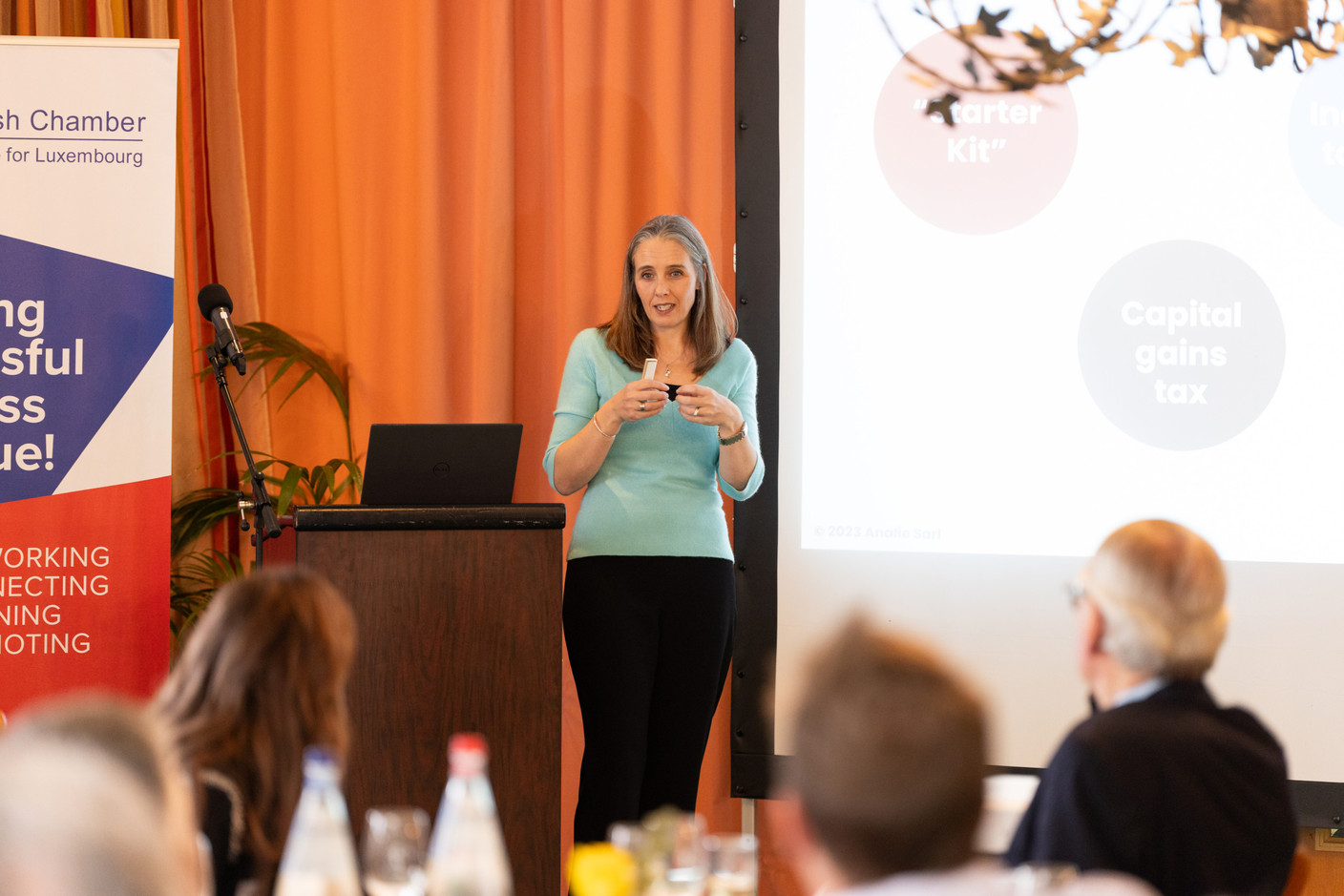“Hot off the press, the recent releases of the new government of Luxembourg, [led by] a very family focused party, [include] lowering taxes, inflation adjustments, higher tax allowances for families with children which means more purchasing power in 2024, but we have to wait and see,” according to Laura Foulds, managing director of Analie Tax & Consulting. Foulds was speaking at the British Chamber of Commerce and Amcham personal tax luncheon on 21 November 2023.
“As for 2022 tax returns, as of mid-October, 48% of individuals and 65% of businesses had yet to submit their tax returns for 2022, according to the ministry of finance,” Foulds stated.
She said that’s a scary statistic and with six weeks remaining until the tax filing deadline, Foulds advised people to finalise their filings sooner, rather than later, just in case they have problems or need help with the paperwork.
Resident tax declarations
Foulds reiterated that, as a Luxembourg resident, you have to declare your worldwide income and there are mechanisms to avoid double taxation, which is different from non-resident taxpayers, who are taxable on Luxembourg sourced income, and for part-time residents, those who have lived part of the year in the grand duchy and part of the year elsewhere, whose income will be split into resident and non-resident periods.
“The key things that you need to think about if you are a non-resident, is that if you’re taxed only on income that comes from Luxembourg sources, unless you make deductions, this is beneficial, it gives a lower tax rate. But not always, you do have to look at it,” she stated.
A question that is frequently asked to Foulds, is what is the optimal approach for couples: filing taxes individually or jointly?
“For some people it’s very straightforward: in the case of single taxpayers then filing individual tax return. The second case would be a registered partnership, and filing an individual tax return is the default option in this case, unless choosing to change to filing jointly. Regardless of the chosen approach, the status of the filing cannot be revoked later, and the taxpayer will need to stick with their selected option.”
Updated deductions
Foulds displayed to the audience the eight categories of income for taxpayers, with common deductions available that can be claimed by everybody with no exclusiveness, with a spotlight on the updated deductions, which are deductions on mortgage interest in 2024 up to €1,500-€3,000, compared to up to €1,000-€2,000, and support for children living outside a household can be €4,422 a month in 2024 compared to €4,020, per child.
Mortgages will get higher deductions on interest, she explained. Single taxpayers can claim up to €3,000, while married couples with two children can claim up to €12,000. As for tax credits for children living outside of the household, Foulds presented a hypothetical case of a couple about to divorce, who will have joint custody of their children. For tax purposes, the children can only be registered with one parent, and it is the parent who receives the state family allowance who claims a higher deduction from mortgage interest, while the other parent claims support for children outside household, so both parents can claim different deductions.
Filing deadlines & appeals
For filing deadlines, Foulds reminded the audience about the importance of filing tax returns according to the timeframe set by the authorities. Late filings can not only accrue penalties, filers potentially lose the chance to get tax refunds. She then showed the correlation with tax assessment and appeals, where the tax office has five years to issue assessments, and a tax assessment is generally received 6-18 months after submission, but turnaround time in 2022 was faster than average and more people tax had assessments issued for them. And because it’s not uncommon for tax office re-assessments to contain errors, there’s a three month period for appeal.
Key takeaways
There are four main items in store for next year, Foulds said. These are increasing income tax brackets and salary credits; increasing the percentage of homeworking permitted, up to 50% for workers who don’t live in the country, for social security purposes; increased benefits in terms of luncheon vouchers and company car benefits; and change in work permits of third country nationals. Standard VAT rate will revert to 17%, which was the standard VAT rate in 2022.
Cross-border tax updates
As of 1 January 2024, cross-borders commuters from Germany working in Luxembourg full time can have 34 days of teleworking and still pay income taxes in Luxembourg. If they exceed 34 days, workers potentially face German social security and payroll obligations.
Taxpayers should, of course, consult with a professional about their specific tax situation.
Laura Foulds is a charted tax advisor, a specialist in personal and expatriate taxation. Before founding her company Analie in 2013, Foulds spent 16 years with Big 4 firms in the UK, US and Luxembourg.





































